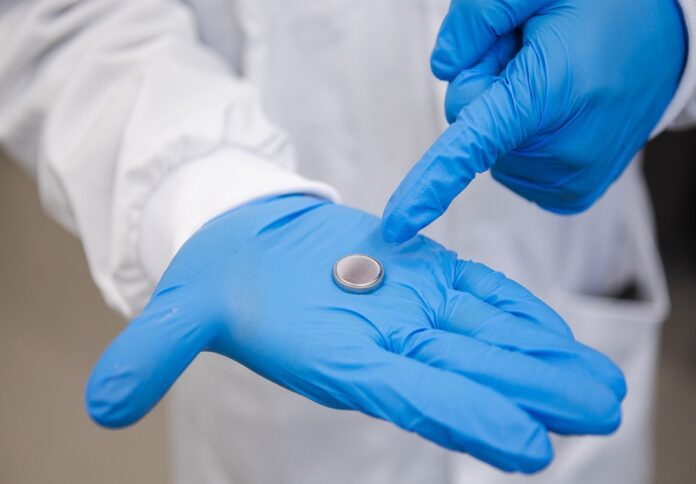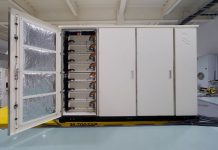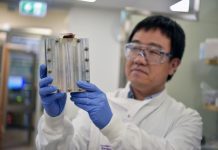
A collaborative effort led by RMIT University has yielded the creation of recyclable ‘water batteries’ that promise enhanced safety and environmental sustainability.
In particular, a team of researchers, spearheaded by Distinguished Professor Tianyi Ma from RMIT’s School of Science, has pioneered aqueous metal-ion batteries, colloquially termed ‘water batteries’, as a safer alternative.
Unlike their lithium-ion counterparts, these innovative batteries utilise water in lieu of organic electrolytes, mitigating the risk of fire or explosion.
Professor Ma emphasised the simplicity of the manufacturing process, attributing it to the use of abundant, less toxic materials such as magnesium and zinc.
In a news release, the research team said it has successfully addressed significant technological challenges, including dendrite formation, a common issue in battery development.
By coating battery components with a protective layer of bismuth and its oxide, the growth of disruptive dendrites has been curtailed, ensuring prolonged battery lifespan and enhanced performance.
Published in esteemed journals such as Advanced Materials and Small Structures, the team’s research showcases remarkable progress, with energy density approaching that of commercial lithium-ion batteries.
Notably, a magnesium-ion water battery has achieved an energy density of 75 watt-hours per kilogram, marking a significant advancement in the field.
Looking ahead, Professor Ma envisions magnesium-ion water batteries as viable alternatives to both lead-acid and lithium-ion batteries, with potential applications ranging from grid storage to household energy solutions.
“We also collaborate closely with researchers and experts from renowned universities and research institutions in Australia, US, UK, Japan, Singapore, China and elsewhere,” Ma noted.
He added, “These collaborations facilitate knowledge exchange and access to cutting-edge facilities. By drawing on this global team’s expertise in different areas, we can tackle the complex challenges involved from various angles.”
The team’s latest research ‘Synergy of dendrites-impeded atomic clusters dissociation and side-reactions suppressed inert interface protection for ultrastable Zn anode’ is published in Advanced Materials (DOI: 10.1002/adma.202400237).
A collaborative effort led by RMIT University has yielded the creation of recyclable ‘water batteries’ that promise enhanced safety and environmental sustainability.
In particular, a team of researchers, spearheaded by Distinguished Professor Tianyi Ma from RMIT’s School of Science, has pioneered aqueous metal-ion batteries, colloquially termed ‘water batteries’, as a safer alternative.
Unlike their lithium-ion counterparts, these innovative batteries utilise water in lieu of organic electrolytes, mitigating the risk of fire or explosion.
Professor Ma emphasised the simplicity of the manufacturing process, attributing it to the use of abundant, less toxic materials such as magnesium and zinc.
In a news release, the research team said it has successfully addressed significant technological challenges, including dendrite formation, a common issue in battery development.
By coating battery components with a protective layer of bismuth and its oxide, the growth of disruptive dendrites has been curtailed, ensuring prolonged battery lifespan and enhanced performance.
Published in esteemed journals such as Advanced Materials and Small Structures, the team’s research showcases remarkable progress, with energy density approaching that of commercial lithium-ion batteries.
Notably, a magnesium-ion water battery has achieved an energy density of 75 watt-hours per kilogram, marking a significant advancement in the field.
Looking ahead, Professor Ma envisions magnesium-ion water batteries as viable alternatives to both lead-acid and lithium-ion batteries, with potential applications ranging from grid storage to household energy solutions.
“We also collaborate closely with researchers and experts from renowned universities and research institutions in Australia, US, UK, Japan, Singapore, China and elsewhere,” Ma noted.
He added, “These collaborations facilitate knowledge exchange and access to cutting-edge facilities. By drawing on this global team’s expertise in different areas, we can tackle the complex challenges involved from various angles.”
The team’s latest research ‘Synergy of dendrites-impeded atomic clusters dissociation and side-reactions suppressed inert interface protection for ultrastable Zn anode’ is published in Advanced Materials (DOI: 10.1002/adma.202400237).


















